Targeted Leadership TA Series
in collaboration with:Series 2 (Spring–Fall 2022)
We are excited to announce virtual TA opportunities for Part C and Part B, Section 619 coordinators and other state agency staff designed to build on individual leadership knowledge and skills. Guided by coordinator responsibilities and interests, this leadership series addresses building teams and networks and tailoring solutions:
- Leading from the Middle
- Driving Partnerships by Listening and Defining Common Interest
- Pursuing Equity in Funding and Access to Services
- Building on Team Capacity and Planning for Leadership Transition
Participants will identify leadership strategies to shift policy, program, and practices to ensure equitable access to high-quality services by tailoring solutions that result in positive outcomes for each and every young child with disabilities and their families, especially those who have been historically underserved.
The planning team for these standalone sessions includes representatives from Part C and Part B, Section 619 coordinators, DaSy, ECPC, ECTA, ITCA, and NASDSE 619 Affinity Group. These sessions will align with the ECPC Knowledge and Skills and the Executive Order on Advancing Racial Equity and Support for Underserved Communities.
Participation and Accessibility
- Participation for all sessions is encouraged but not required.
- We will make every effort to honor accessibility requests. Please give at least 3 weeks notice if possible.
- The webinar will be automatically captioned and a recorded event with captions will be made available after the event.
- We cannot issue CEUs for attendance of these events.
If you have questions about this series, contact Alyson Cavanaugh at alysonc@unc.edu or Sharon Walsh at sharon.walsh@unc.edu
Session 1: Leading from the Middle
Knowledge and skills in leading from the middle are essential competencies for Part C and Part B, Section 619 leaders. This two-part opportunity allows you to learn about using your leadership position to strategically communicate, influence, and empower and encourage others.
Glenda Gallo provides an introduction to the series:
Session 1, Part 1: Maximizing Influence through Collaboration and Communication
- April 6, 2022
Part 1 includes a panel of state leaders who will discuss their experiences, and offer examples of opportunities and the important skills needed to lead from the middle of an organization. This includes leading to:
- increase opportunities,
- remove barriers, and;
- ensure that resources, burdens, and rewards are distributed in ways that eliminate inequities.
Featured Panelists
Dr. Andrea Brinnel
Dr. Andrea Brinnel is an early childhood consultant with the CT State Department of Education. She manages IDEA Part B, preschool special education, as well as general early childhood initiatives. With more than thirty years of experience in education, Dr. Brinnel has been a classroom teacher and central office administrator in both CT and MA. She has worked in the fields of early childhood and special education, placing an emphasis on the meaningful inclusion of children with disabilities in general education settings and the importance of building an educational continuum birth through grade 3.
She was formerly at the CT Office of Early Childhood where she managed state funded preschool programs including Smart Start, School Readiness and the Head Start State Supplemental Grant Program.
Dr. Brinnel is an adjunct faculty member at Bay Path University where she teaches and has designed online courses in the areas of special education and early childhood.
Dr. Brinnel presented on early learning issues at both the 3rd and 4th annual International Educational Symposia in the United Arab Emirates as well as nationally and in CT about a wide variety of early learning topics. Her research includes a phenomenological study of the experience of CT elementary school principals leading effective schools that are inclusive of prekindergarten.
Kimberly Hauck
Kimberly Hauck was appointed as director of the Ohio Department of Developmental Disabilities in January of 2022 by Ohio Governor Mike DeWine.
Hauck previously served four years as Chief Policy Officer at DODD and four years as the Assistant Deputy Director for the state's Early Intervention system. She began her career as a direct support professional providing services for people with developmental disabilities. Hauck then joined the Hamilton County Board of Developmental Disabilities as a special education teacher and early intervention specialist. She also served in various other positions throughout her 22 years with the board including Director of Children's Services and Director of Program Services.
Throughout her career, Hauck has been an advocate for Ohioans with developmental disabilities and their families. She received a Bachelor of Science in Special Education at the University of Cincinnati and a Master of Educational Administration from Xavier University.
Dr. Charlie Silva
Dr. Charlie Silva has worked as an Assistant Professor at Boise State University, was the Administrator of Special Education for the Boise School District and for the past 7 years has been the Idaho State Department of Education Director of Special Education Services. In her capacity as state director, she and her team are responsible for providing guidance and support to over 170+ Local Education Agencies (districts)/Charters across the state. She is passionate about making sure the Individuals with Disabilities Education Act (IDEA) is followed and strives to meet the department's mission: "to enable all students to achieve high academic standards and quality of life, the Special Education department works collaboratively with districts, agencies and parents to ensure students receive quality, meaningful, and needed services".
Dr. Sherri Killins Stewart
Dr. Sherri Killins Stewart is the Director of State Systems Alignment and Integration and Co-Director of State Services for the BUILD Initiative and an independent consultant. Within her BUILD Initiative work, she is responsible for working directly with state leaders to advance early childhood systems efforts in health, early learning, and family support. She is leading work to define and create intentional practice regarding equity in early childhood system practice, policy, and leadership within the BUILD Initiative. Her equity work includes co-leading a network of early childhood leaders to advance racial equity. Dr. Stewart has worked at multiple levels and in a variety of states and communities. Dr. Stewart's former positions include Commissioner of Early Education and Care for the Commonwealth of Massachusetts, Vice President of Human Development and Operations at the Annie E. Casey Foundation, and CEO of Empower New Haven. Her consulting clients have included BUILD, W. Clement & Jessie V. Stone Foundation, New Haven Public School System W.K. Kellogg Foundation, Ascend at the Aspen Institute, the Campaign for Grade-Level Reading, and Pearson Publishing.
Dr. Stewart is known for crossing organizational boundaries to create a child development lens on the work of informal organizations as well as within other state agencies, including public health, housing, libraries, and museums.
Throughout her career, Dr. Stewart has been committed to creating opportunities for families, both children, and adults, through the use of the workforce, housing, health, and education strategies. Her efforts seek to increase access for families and communities to high-quality formal and informal opportunities in health, early learning, and family wellbeing. Dr. Stewart holds a nursing degree from the University of Pittsburgh, a Master of Administrative Science from Johns Hopkins University, and a doctorate in counseling psychology from the University of Sarasota.
Several organizations have recognized Dr. Stewart; examples include the Massachusetts Reading Association Legislative Award for her leadership in promoting early childhood literacy and Horizons for Homeless Children Public Leadership Award. She is currently the Vice-Chair of NHChild and served as former co-chair and current New Haven Early Childhood Council member.
Tracy Turner
Tracy Turner oversees two federally funded programs within DDS that support parents of children with special needs in accessing resources, advocating for their child with special needs, and knowing how to support their child's growth, health, and development. Achieving these goals requires teamwork and collaboration with related programs, agencies, nonprofits, contracted providers, and advocates. Ms. Turner shares her energy, vast experience in the social services field, early childhood perspective, and passion for parents' rights by serving as a stakeholder in the work of related agencies, divisions, and organizations. She serves as a member of the Arkansas Learn the Signs Act Early state team, and her work with the Arkansas Fetal Alcohol Spectrum Disorders Task Force earned her the Outstanding Community Partner Award in 2015. Tracy Turner is the recipient of the 2017 Employee of the Year for both the Arkansas Division of Developmental Services and the Arkansas Department of Human Services.
Tracy Turner builds on State strengths by aligning program improvement goals for the programs she oversees with related state initiatives in partnering programs. This strategy requires her to be informed and even involved in the work of partnering agencies, organizations, and groups around the state. Collaboration with programs such as Arkansas' Department of Education, Health Department and WIC, Infant Hearing Program, institutes of higher education, Arkansas' Children's Hospital, and MIECHV Home Visiting programs like Follow Baby Back Home fosters a spirit of understanding and cooperation to streamline and improve the delivery of human service programs that reduces duplication of efforts.
As Part C Coordinator, Tracy completes the annual grant application that ensures that First Connections, Arkansas' Early Intervention Program, receives funding. She submits the Annual Performance Report and ensures that the State is implementing the Individuals with Disabilities Education Act, Part C to protect the educational rights of infants/toddlers with developmental delay or disability and to support parents and other caregivers in helping their young children develop and learn.
As Director of the State's Title V Program for Children with Special Health Care Needs (CSHCN), Tracy collaborates with other Maternal and Child Health (MCH) Block Grant programs at the Arkansas Department of Health to ensure federal program requirements are met. Additional collaboration with the Parent Advisory Council (PAC), Arkansas Disability Coalition, and DDS staff identifies the State's strengths and needs to set priority focus areas to reach State and National measures.
Under her leadership, these two DDS programs have found new ways to work together to improve outcomes for families of children with special needs.
Also Appearing
Glenna Gallo
Glenna Gallo has served as the Assistant Superintendent of Special Education in the Office of Superintendent of Public Instruction (OSPI) in Washington since 2017. Prior to that, she spent seven years as the State Director of Special Education for the Utah State Board of Education (USBE), following work as a classroom teacher and administrator. She has over 25 years of public education experience supporting students with disabilities and adults entering and within the teaching profession, and 16 years of experience in state-level educational leadership with expertise in the improvement planning, data analysis, and monitoring of public prek-12+ special education programs. Glenna has a B.S and an M.S in Special Education, a special education teacher and administrative licenses, endorsements as a Program Administrator, Principal, and Superintendent, and an M.B.A.
During her work in Washington state, special education programs were allocated an additional $155 million dollars for state special education programs, $37 million dollars for improvement of statewide inclusionary practices, $12 million dollars for paraeducator training, and $60,000 to reduce the use of restraint and isolation, revised the historical state special education funding allocation formula to a two-tier system that supports inclusionary practices, and revised the state high needs risk pool process to reduce administrative burden on school districts. Collaboration is a priority for her work, and collaborative efforts are infused within all state efforts regarding students with disabilities. Glenna feels strongly that application of the intent of IDEA requirements results in increased student outcomes for students with disabilities and works with school and district administrators, special education staff, advocates, and parents/families of students with disabilities at the local education agency (LEA), state, and national levels to review research, current student achievement data, stakeholder feedback, and compliance data to ensure state and local efforts are addressing instructional issues that impact results for students with disabilities.
Session 1, Part 2: Application in your Daily Work
- April 14, 2022
Part 2 offers an opportunity to explore practical strategies using scenario-based activities.
Session 2: Driving Partnerships by Listening and Defining Common Interest
- June 29, 2022
Listening to the values, beliefs, and worries of those we are communicating with is key for advancing our goals to ensure that each and every child and family benefits from our programs, policies, and practices. Establishing feedback loops with partners and those most impacted by decisions increases trust and leads to more sustainable solutions.
Dr. Sherri Killins Stewart, Sherri Britt Williams, and your colleagues will share resources and engage in problem solving together, building on our skills for leading from the middle.
Participant Objectives
- Receive information and strategies from state leaders who are collaborating and communicating within programs and communities, and across sectors;
- Explore structural and interpersonal aspects of effective communication to increase opportunities and reduce barriers for historically underserved groups of young children and families; and
- Reflect on actions to communicate and collaborate with colleagues and other partners.
Featured Panelists
Dr. Sherri Killins Stewart
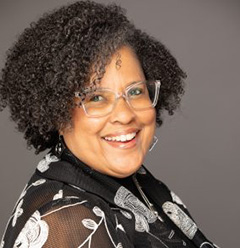
Dr. Sherri Killins Stewart is the Director of State Systems Alignment and Integration and Co-Director of State Services for the BUILD Initiative and an independent consultant. Within her BUILD Initiative work, she is responsible for working directly with state leaders to advance early childhood systems efforts in health, early learning, and family support. She is leading work to define and create intentional practice regarding equity in early childhood system practice, policy, and leadership within the BUILD Initiative. Her equity work includes co-leading a network of early childhood leaders to advance racial equity. Dr. Stewart has worked at multiple levels and in a variety of states and communities. Dr. Stewart's former positions include Commissioner of Early Education and Care for the Commonwealth of Massachusetts, Vice President of Human Development and Operations at the Annie E. Casey Foundation, and CEO of Empower New Haven. Her consulting clients have included BUILD, W. Clement & Jessie V. Stone Foundation, New Haven Public School System W.K. Kellogg Foundation, Ascend at the Aspen Institute, the Campaign for Grade-Level Reading, and Pearson Publishing.
Dr. Stewart is known for crossing organizational boundaries to create a child development lens on the work of informal organizations as well as within other state agencies, including public health, housing, libraries, and museums.
Throughout her career, Dr. Stewart has been committed to creating opportunities for families, both children, and adults, through the use of the workforce, housing, health, and education strategies. Her efforts seek to increase access for families and communities to high-quality formal and informal opportunities in health, early learning, and family wellbeing. Dr. Stewart holds a nursing degree from the University of Pittsburgh, a Master of Administrative Science from Johns Hopkins University, and a doctorate in counseling psychology from the University of Sarasota.
Several organizations have recognized Dr. Stewart; examples include the Massachusetts Reading Association Legislative Award for her leadership in promoting early childhood literacy and Horizons for Homeless Children Public Leadership Award. She is currently the Vice-Chair of NHChild and served as former co-chair and current New Haven Early Childhood Council member.
Gretchen Stahr Breunig, MPA
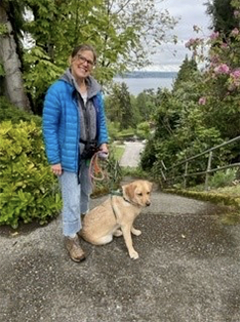
Gretchen Stahr Breunig, MPA works at OSPI Early Learning Division focusing on elementary education, early learning, special programs, and federal accountability. Gretchen has served in a range of roles for non-governmental and public agencies to support the quality and affordability of early learning services for low-income children and families. She received her BA in International Relations at Stanford University with a focus on nutrition in developing nations and MPA at Columbia University with a focus on early learning and management. She is mom to two adult children and a daughter-in-law, and works from home in Seattle with her yellow Labrador, Izzie.
Julie Dean
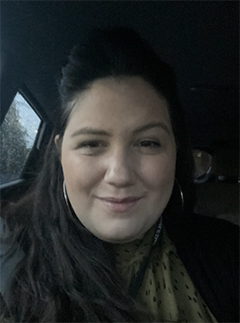
Julie Dean is the Early Childhood Special Education (ECSE) Inclusion Specialist at Washington state OSPI Special Education Division, supporting the Pre-K Inclusion Champions Initiatives which include the implementation of the Washington Pyramid Model (WAPM) coaching, training, and data coordinator network along with supporting the State Systemic Improvement Plan (SSIP) and other special projects. Julie is a Board-Certified Behavior Analyst (BCBA) with extensive experience supporting students with disabilities, families, and educators with inclusive learning opportunities, MTSS implementation, and systems-level coaching.
Ryan Guzman, M.Ed.
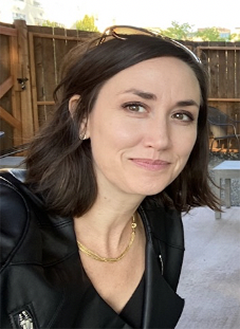
Ryan Guzman, M.Ed. is the Washington state Early Childhood Special Education-619 Coordinator. With over 19 years of experience, Ryan has assumed many roles in the field of early childhood special education, including Developmental Preschool Teacher, Part C, IDEA, Early Intervention Case Manager, PreK–1 Intervention Specialist, and later Regional Administrator of Early Childhood and Special Education with Educational Service District 113.
Ms. Guzman is currently coordinating the implementation of several ECSE Initiatives, including WA Pyramid Model, LEAP Replication, and the State Systemic Improvement Plan (SSIP) Implementation, in partnership with NCMPI, ECTA, NCSI, IDC, The PELE Center, and wide network of statewide early learning partners. She is also leading the Preschool Inclusion Champions Network, which has aligned early childhood and K-12 inclusionary practices and MTSS implementation across Washington state to increase access to high quality learning experience for all children regardless of race, ethnicity, gender, ability or zip code.
Shandy Abrahamson
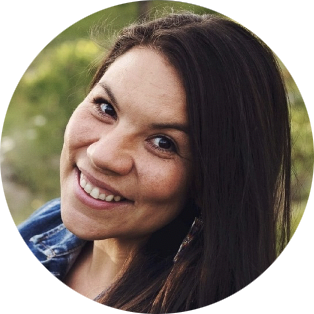
Way', my name is Shandy Abrahamson, Sinixt of the Confederated Tribes of the Colville Reservation and Spokane Tribal member. I am the daughter of Joan Goujon, Sinixt and Robert Abrahamson, Spokane. My paternal grandparents are Joseph and Kathy Abrahamson, Spokane and my maternal grandparents are David St. Paul and Marie Adolph, Sinixt. I currently have the honor of working within the Washington OSPI Office of Native Education as their Career Connect Learning Tribal Engagement Specialist. I have always had a strong passion for lifting our tribal students, families and community through educational pathways.
I have had the opportunities and background in working with Early Childhood Education, Tribal Youth Development, Youth Employment Programs, K–12 Education, Community Development and within higher education working with Washington State University and Wenatchee Valley College. I work with the goal to ensure that cultural relevant dual credit programs are established and implemented within our school districts. I focus on provided training and supports that include understanding tribal sovereignty, tribal consultation, CTE in Tribal Communities, Tribal Relations, Tribal Family Engagement Practices and Community Development. I sit as a Board of Trustee for Humanities Washington and as Chairwoman of a non-profit headed by strong tribal matriarchs, kʷu cnxi?
Dr. Martina Whelshula
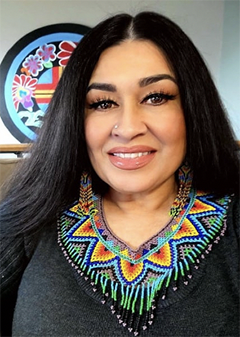
Dr. Martina Whelshula is a Partner/CEO in a consulting business, Swan Innovations LP, with her daughter Cree Whelshula. Swan Innovations envisions Cultural Vitality and overall good health for Indigenous people and Tribal communities. Dr. Whelshula has worked extensively with Native American communities nation-wide in the areas of local and national policy development, education, Tribal culture, and behavioral health. Dr. Whelshula's professional experience has ranged from Research Director for national Indian health policy development for Congressional review, P–12 Tribal language instructor in the public-school system, Head Start Director for the Colville Tribe to Tribal College President.
Dr. Whelshula served for nearly seven years as the Executive Director of a Native American inpatient treatment program for drug and alcohol addicted youth. She is an educator, trainer, and consultant specializing in Indigenous education and intergenerational trauma impacting Indigenous communities. Dr. Whelshula's most recent work is the development of an integrative cultural healing model addressing colonial trauma, culturally grounded mental health approach and substance use disorders for Tribes. She also serves as Principal Investigator for Native American Research Centers for Health research in collaboration with Harvard Medical School's Division on Addiction.
Cree Whelshula
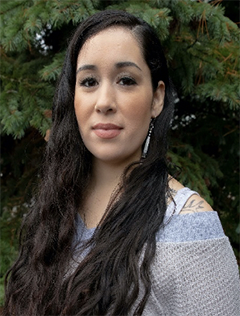
Cree Whelshula's professional and educational experience is a unique blend of Tribal language/culture revitalization, early childhood education, and a passion for mental health. Cree feels her background as a Tribal language immersion teacher, early childhood teacher, college instructor, and program manager is invaluable in her work because she has first-hand experience working with young children and their families in various learning environments. Cree took her knowledge and experience to a national level, serving Tribes through the Administration of Native Americans - Native Language Community Coordination Center. As Training/Technical Assistance Director she provided specialized language training and technical assistance to Tribes across the nation. Cree also serves as Executive Director of the nonprofit kʷu cnxi?, whose primary mission looks to Tribal First Language Speakers and Cultural Knowledge Keepers to guide in recreating Indigenous education that Tribal ancestors practiced prior to colonization. From their wisdom, kʷu cnxi? creates curriculums, educational resources, toolkits, and more to funnel to programs servicing Indigenous youth with an emphasis on mental health.
Nicole Cossette, MS
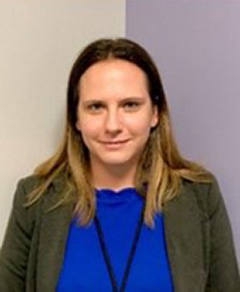
Nicole Cossette, MS came to the Office of Early Childhood after several years of research, evaluation, and grant monitoring. She holds a master's degree in Applied Psychology from Sacred Heart University and is currently completing coursework towards a Ph.D. at Fielding Graduate University. Nicole leads Connecticut's Individuals with Disabilities Education Act (IDEA) Part C Birth to Three System as the Part C Coordinator supporting 19 comprehensive early intervention programs and over 11,000 families each year. She regularly collaborates with colleagues at the State Departments of Education, Health, and Social Services on all matters related to supporting families with infants and toddlers with disabilities and developmental delays.
Session 3: Pursuing Equity in Funding and Access to Services
- October 31, 2022
Meeting the needs of all children and families eligible for Part C and Part B, Section 619 requires intentional and proactive strategies to identify who may not be benefiting as a result of systemic barriers. To address systemic barriers, allocations and investments can be tailored to increase opportunity and remove barriers to access and benefit. Strategies should be informed by a process including disaggregating data to measure benefit by race, ethnicity, language, geography, or other indicators, and feedback loops with families and children, and providers. Listening provides a foundation for taking action that is grounded in the goals of our programs and the opportunities and challenges of communities' children, families, and providers. Data helps inform our shared purpose across partners for multiple sources of funding, programs, and services.
Participant Objectives
- explore strategies to identify specific populations who may not be benefiting;
- explore multiple financial, geographic, and demographic differences and individualized regional program, local program, or district needs, both historical and current to help inform actions like monitoring and allocation of funds; and
- discuss challenges and opportunities for how allocations could meet the demographic and regional differences of communities.
Featured Panelist
Leah Davidson
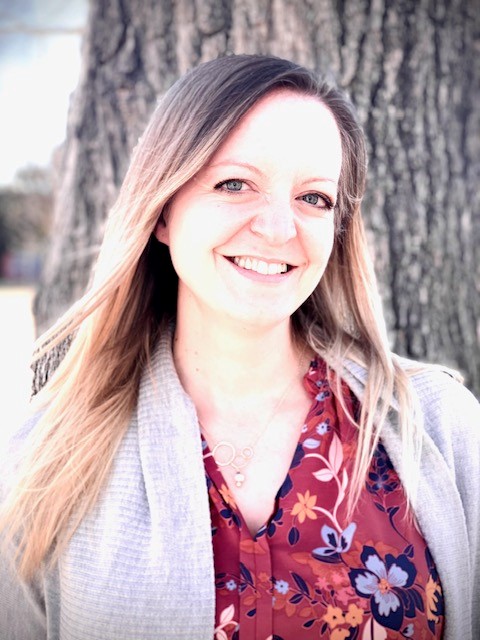
Leah Davidson is a career early childhood professional who is committed to working on behalf of families with very young children in order to maximize joy, growth, and human potential while the brain is most malleable. Leah earned her Master's in Marriage and Family Therapy from Colorado State University in 2008, and began her career in Early Intervention in the state of Virginia shortly thereafter. She worked as a Service Coordinator and then a Local System Manager in Arlington, Virginia for ten years before relocating to New Mexico, where she now serves as the Acting Bureau Chief for New Mexico's statewide Early Intervention system. Leah is the proud mother of one ten-year-old girl and spends her free time singing, hiking, baking and socializing with her friends and family.
Session 4: Building on Team Capacity and Planning for Leadership Transition
- TBA
Information about this session is forthcoming.
Series 1 (Fall 2020–Spring 2021)
These events aligned with the Part C and Part B (619) Leadership Knowledge and Skill Statements by Level and Content Area developed by Part C and Part B (619) Coordinators in collaboration with ECPC. State coordinators are invited to participate in any or all of these virtual TA opportunities.
The planning team for these events included representatives from Part C and Part B (619) coordinators, DaSy, ECPC, ECTA, ITCA, and NASDSE. The leadership series included interactive presentations, webinars, and topical discussion groups presented and facilitated by topical experts beginning this fall 2020 and continuing into 2021.

Session 1: Leadership Styles and The Art of Leadership
October 1, 2020
In this session, our featured speaker is Anne Grady of the Anne Grady Group, an entrepreneur, best-selling author, and two-time TEDx speaker. She is a contributor to Harvard Business Review and Forbes.
Goals for this session include:
- Identify and adapt your leadership style for maximum effectiveness
- Tap into individual motivators and strengths
- Adopt a growth mindset which will transform the way you approach challenge and adversity
- Build trust and grow relationships
Session 2: Your Leadership Role in Implementing and Influencing Policy
December 14, 2020
This 90-minute interactive session focuses on state leadership needed to proactively influence policy and its implementation as well as to respond to policy implications resulting from federal and state changes.
The speakers are:
- Sharon Walsh Technical Assistance Specialist, ECTA/DaSy
- Deborah Ziegler Technical Assistance Consultant, ECPC
Session 3: Adaptive Leadership: How Do We Solve Complex Problems We Encounter Daily in Our Implementation Work?
March 29, 2021
Many different implementation challenges are encountered on a daily basis in systemic change efforts. Some are easily addressed while others are complex and can generate different emotions among implementers and stakeholders. These different types of challenges (technical and adaptive) need different types of leadership strategies. In this session, participants will work through various case illustrations to recognize different types of challenges encountered and apply the leadership strategies needed.
The speaker for this event is:
Dr. Caryn Ward
- Director of SISEP Center
- Associate Director of Education and Measurement
- National Implementation Research Network (NIRN)
- Frank Porter Graham Child Development Institute
- The University of North Carolina at Chapel Hill
Session 4: Data Leadership and What it Means for Equity
June 22, 2021
By the end of this session, participants will be able to:
- Understand and embrace their roles as leaders in asking questions about equity and using data to answer those questions.
- Understand the multiple "equity touchpoints" in the delivery of early intervention and preschool special education services.
- Gain awareness of the importance of addressing equity at each step across the data collection, analysis, reporting, and use cycle.
- Acquire introductory knowledge of how to address equity at each step across the data collection, analysis, reporting, and use cycle.
Inequities can exist throughout early intervention and early childhood special education service delivery process, from pre-referral though transition, and will remain invisible unless identified and addressed by committed leaders. This session will provide an introduction to what it means to use data to lead for equity through the use of critical questions that program leaders should ask to gain greater understanding of inequities. By becoming aware of how equity needs to be addressed in every step of the data use process, from data collection design through interpretation and reporting.
The speakers for this event are:
- Kathleen Hebbeler, Co-Project Director, DaSy
- Grace Kelley, Deputy Director, DaSy
- Cindy Weigel, TA Specialist, DaSy
Part C and Part B 619 Leadership Knowledge and Skill Statements emphasized in this session are:
Programmatic Leadership
- Demonstrates the ability to gather and use input from multiple and diverse stakeholders to effectively administer the Part C and/or Part B (619) system.
- Demonstrate the ability to use data to guide all Part C and/or Part B (619) system and programmatic decisions.
- Is knowledgeable about evaluation models and data collection systems to measure the implementation of a program or system.
Transformational leadership
- Demonstrates the ability to use consensus-building strategies with stakeholder groups to achieve a common understanding of the need, a shared vision to improve the need, and a plan to address the need through measurable actions represented by work plans that articulate objectives, activities, timelines and outcomes to implement components of the larger strategic plan.
- Demonstrates the ability to initiate actions to develop and/or reform state and national policies and practices that improve outcomes for all infants and young children and their families.
- Demonstrates the ability to monitor the ongoing progress and achievement of outcomes of the strategic plan through the collection of data from multiple sources.




